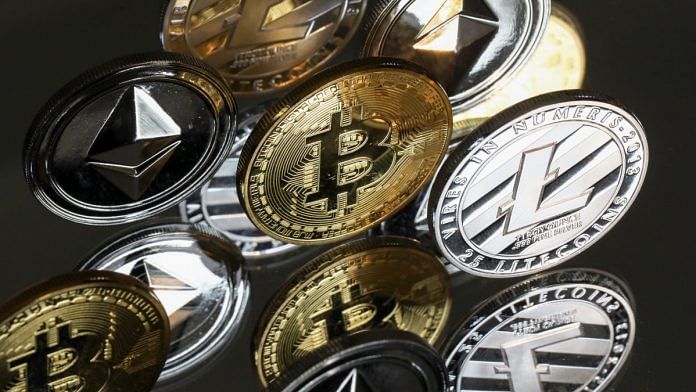New Delhi: Prime Minister Narendra Modi is likely to ask G20 leaders — at the Bali meeting to be held at the end of this year — for a joint effort to regulate private digital assets to prevent money laundering and other illicit activities through cross-border trading of these assets, a senior government official told ThePrint.
The information comes a day after Finance Minister (FM) Nirmala Sitharaman, in the Budget for 2022-23, proposed to levy a 30 per cent tax on the gains made from the transfer of virtual digital assets in the Budget. The Budget also mentioned that, to ensure that the government can monitor these transactions, there will be a 1 per cent tax deductible at source (TDS) levied on such transactions.
Sitharaman didn’t specify the threshold over which TDS will be applicable, but clarified that even a gift of virtual digital assets will be taxed at the recipient’s end.
Her announcement in the Budget largely ended the uncertainty over the future of cryptocurrencies in India. It came a day after Principal Economic Adviser Sanjeev Sanyal said Monday that the government would take a balanced view on digital currencies.
The 17th G20 Heads of State and Government Summit will take place at the end of 2022 in Bali. However, the back-channel discussions will start before that, ThePrint has learnt.
“The Prime Minister has already spoken on two international forums about the (cryptocurrency) issue. He is now likely to discuss with the G20 leaders in the next meeting about how nations can work together to regulate crypto assets to prevent illicit activities,” the official, who did not wish to be quoted, told ThePrint.
Also read: Digital currency continues to decline wiping out over $1 trillion in market value
‘Preventing wrongful activity through crypto trading’
The idea, according to the official, is to develop an understanding, if not an agreement, among G20 nations on sharing technology that can prevent any “wrongful” activity through the trading of crypto assets.
“Therefore, the PM is of the view that this must be raised in the G20 forums as soon as possible,” the official said.
At the Sydney Dialogue in November 2021, PM Modi had said, “It is important that all democratic nations work together on cryptocurrency and ensure it does not end up in the wrong hands, which can spoil our youth.”
The official also said that after many deliberations between the Reserve Bank of India and other stakeholders, there is finally an understanding on how to regulate the virtual digital asset market in India. The government, along with the RBI, will come out with a framework in 2022-23 for the same, the official added.
The market for private cryptocurrencies was left shaken at the end of last year, when the Modi government listed the ‘Cryptocurrency and Regulation of Official Digital Currency Bill, 2021’ in the Lok Sabha ahead of the winter session. However, the bill wasn’t introduced.
What spooked the market was the description of the bill, which sought to prohibit all private cryptocurrencies in India, but allowed for certain exceptions to promote the underlying technology of cryptocurrency and its uses.
In the Budget, Sitharaman also announced that the RBI will introduce its digital currency in 2022-23 using blockchain and other technologies.
(Edited by Poulomi Banerjee)
Also read: India doesn’t understand crypto enough to pass regulatory law. Here’s all you need to know



